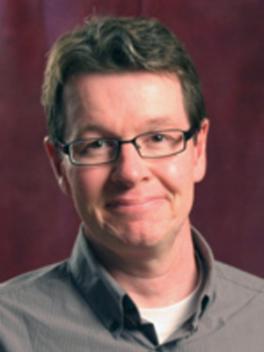Chris Highley: A day in the right "direction"

Director of the Center for Medieval and Renaissance Studies and Professor Chris Highley tells us what it's like to both teach and direct a program of study, which leads to an eventful day of connecting people and ideas.

My days include a happy variety of stimulating work, for I am both a busy Professor of Renaissance Literature and Director of the Center for Medieval and Renaissance Studies. I commit the same amount of energy each semester to directing CMRS as I would to teaching any class. I plan the year’s events, including a lecture series and a symposium, with the help of my trusty Administrative Manager Nick Spitulski, Associate Director Leslie Lockett, and the CMRS Advisory Committee. Much of my work involves emailing invitations, answering questions and keeping in touch with many people and organizations on and off campus.
I enjoy the business of running the Center and seeing all the planning come together. Just last week, I confirmed the sixth and final speaker for next year’s CMRS provocative symposium on ‘The Americas before 1620: Interdisciplinary Perspectives on Indigenous Cultures, Colonialism, and Slavery’ (Feb. 21-22). I eagerly look forward to hearing the great papers and joining in the lively discussions they inspire. I feel privileged to lead a Center that supports exciting intellectual inquiry and that both reaches across traditional departmental boundaries and out to the public.
I devote most of my time to teaching, though, for guiding students in the classroom, on Study-Abroad programs, or in office-hour conferences has always been what I like the most about this job. I dedicate as much time as possible to preparing for class, even if I’ve taught the work a hundred times before. I still get excited about Macbeth, Hamlet and many other works, and I hope my enthusiasm inspires my students. Their eager interest certainly inspires me and I like their many unexpected questions and perceptive observations. I teach many Shakespeare classes, but I also enjoy designing new courses and teaching works for the first time. Look out for a future class on "The Literature of Contact and Colonialism in the Early Modern British Atlantic," in which we’ll read such overlooked classics as Sir Walter Raleigh’s The Discovery of Guiana.
I give a third of my time to research and writing conference papers, articles, and books, carving out short periods for that work during busy terms, but writing steadily in the summer months. Right now I await readers’ reports from the university press that is evaluating my book manuscript. I will revise the manuscript in light of their comments.
Altogether, I feel lucky to have such a fulfilling job, filled with a variety of fascinating people and continual discoveries.
